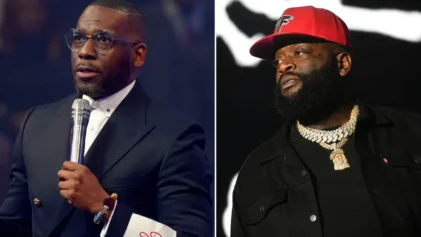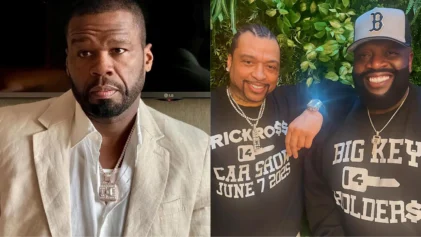The debate over negative lyrics in hip hop is at an all time high as hip hop artists can’t see eye to eye on what is causing the negative lyrics and how to restore hip hop back to its original state.
With Lil Wayne slandering the name of Emmett Till, Rick Ross rapping about date rape, and 98% of every male rapper expecting women to take “bad bitch” as a compliment it’s no surprise that the current state of hip hop has many people in the urban community extremely concerned.
The debate starts with the tricky question of what is causing the negative lyrics in the first place.
Talib Kweli and Lupe Fiasco took to Twitter to debate in a public space where the question of “Which came first, the chicken or the egg,” was transformed into “Which came first, the negative community or the negative music?”
Talib believes that the negative community came first and they formed the troubled backgrounds that influences the music of many rappers.
“I don’t think young ppl rapping abt violence & misogyny are ‘evil,’” the 37-year-old Brooklyn native tweeted. “I think they are products of their environment & I wont give up on them.”
In other words, the rappers aren’t producing negativity so much as they are victims of it as well.
Lupe Fiasco, on the other hand, didn’t see things in the same light.
The 31-year-old rapper from Chicago claimed that the rappers are the ones producing the ignorant lyrics and thus ruining our youth and until we do something about it the vicious cycle will continue.
“We meekly hold ambiguous forces solely responsible & disregard when concrete agents constantly parade in front of us as evidence @TalibKweli,” he tweeted in response to Kweli.
In other words, society needs to put the blame on the rappers because they are the ones encouraging their fans to follow in their negative footsteps.
He even was sure to point out that hip hop seems to be the only genre of music that insists on promoting violence.
“Name one other form of mainstream MUSIC that CONSTANTLY pushes violence and death,” he challenged.
This is when the “chicken or the egg” question comes into play.
“Negative lyrics are a symptom, not a cause of pathologies in our community,” Talib responded, enforcing his view that the community creates the music rather than the music creating the community. “Therefore we should embrace our artists, not shun them. That to me is strategic.”
The Twitter debate extended on for quite some time with each rapper trying to get his point across in a very healthy debate, but that last tweet from Kweli seems to be where the HuffPost Live conversation picked up.
If you’re anything like me, the notion of embracing some of these rappers makes your stomach flop. Maybe I’m just awkward, but I’ve never really been turned on by a guy telling me he was going to slip something in my drink or comparing his sex to the brutal and heartless murder of a teenage boy just because he was black. Call me old fashioned I guess.
While I understand the notion of “embracing” the rappers doesn’t mean you have to like them or love them, I don’t see how accepting their music with open arms will help change anything – simply because we tried that already. Obviously it’s worked out so well (insert sarcasm here).
When Rick Ross rapped about “Hustlin” every day, we welcomed it and ignored it until he slowly but surely got comfortable enough to tell us that some of those drugs conveniently make their way into unsuspecting women’s drinks. We even gave Lil Wayne a pass all these years and “embraced” his music while he told us he wanted to “F*** every girl in the world” and asked all the “bad yellow bones” to lick his “Lollipop.”
It seems like the more we embrace, the worse things are getting and that’s exactly what was debated on HuffPost Live.
Ebony Magazine’s News & Life Editor Jamilah Lemieux, columnist for the Washington Post Rahiel Tesfamariam, 2008 Green Party vice presidential candidate Rosa Clemente, and none other than Talib Kweli joined together to debate not just where the negative lyrics stemmed from, but what exactly is the solution to save hip hop?
Spoiler Alert: No general consensus was ever met and the answer is obviously still up in the air.
However, Kweli did try to reinforce his “embrace” theory again and managed to talk over everyone else in the debate in order to do so.
“People might forget what you said, but they never forget how you made them feel,” Talib insisted as the reason why we shouldn’t shun the rappers and make them feel abandoned by society.
I don’t have the answer on how to rescue hip hop but I do know that as a 19-year-old African American woman growing up in today’s hip hop culture nobody ever ONCE seemed too concerned with how their music made me feel – which was insignificant, cheap, and like nothing more than a curvy body (or lack thereof).
Perhaps I’m speaking from being bitter, but after years of finally piecing my self esteem back together and being ridiculed for not wanting a life that was all about violence, sex, and drugs I don’t care (nor should anyone else) how Rick Ross feels about me shunning his music and I certainly don’t care what happens to Lil Wayne’s record sales if I decide to bash him in every article I write for the rest of my life.
It’s not certain if the community creates the music first or if the music creates the community, but either way they both impact one another in a major way. So perhaps the key to getting hip hop back is to first get our community back, but I don’t think that’s going to happen by us patting these rappers on the back and telling them “It’s not you, it’s your childhood.”
My childhood wasn’t a skip through a field of daisies, but I’m not using that as an excuse to spread negativity.
But that’s just me…
At the end of the day there seem to be two opposing views of how to go about saving Hip Hop and doing away with negative lyrics, and the real solution is hiding somewhere in the middle.


